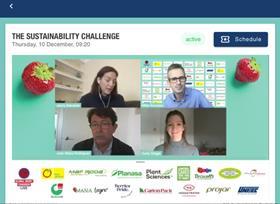
Once seen as little more than a useful marketing tool, sustainability has risen rapidly up the agenda to become an integral part of corporate strategy.
In a panel discussion at Global Berry Congress, Jenny Edwards of SAI Platform said there has been a fundamental shift in how companies perceive sustainability over recent years, which is being driven both by increased consumer awareness, and companies’ growing realisation that it affects their bottom line.
Edwards explained that Covid-19 had shone a light on the fact that supply chains aren’t as agile or resilient as was once thought. A failure to implement solid practices on the ground at farm level, she said, exposed faults right along the supply chain.
Juan María Rodríguez of Spanish organic berry specialist Flor de Doñana illustrated the point perfectly, explaining that the company prioritisation of the environment and surrounding communities has enabled it to weather the Covid storm better than most as its workforce consists almost entirely of local workers, enabling it to avoid labour shortages due to movement restrictions.
Edwards explained that the pandemic has had both a positive and negative impact o shaping attitudes towards sustainability. On the plus side, it has made companies realise the need for greater transparency in their supply chains, and closer working relationships with their partners in order to increase resilience.
On the minus side, however, she noted that Covid’s impact on consumer finances would make buying decisions harder for consumers, who may no longer be able to afford premium, sustainable products. In medium to long term, however, she remained confident that the pandemic will have a positive impact on supply chain management.
Carly Griggs of Innocent Drinks agreed that the pandemic has underscored the strengths and challenges within the berry business. Transparency has been a key issue, in particular trying to carry out third party audits without having “boots on the ground”.
Griggs also made the case for the sustainability agenda becoming a well-integrated part of many company’s business strategy, noting that commercial teams play a key role in communicating successes to customers.
Citing the success of the Doñana Project in Spain, Edwards emphasised the need for pre-competitive collaboration, the notion that everyone in the supply chain should work together to find industry-wide solutions to sustainability challenges.
Next up, Andres Armstrong of the Chilean Blueberry Committee, gave an overview of the progress the Chilean blueberry industry has made with regards to sustainability. He pointed to the growth in organic blueberry production in Chile, which has encouraged growers to adopt a more considerate approach to environment.
Armstrong also discussed the social element of sustainability, outlining some of the measures the sector has adopted in order to keep workers safe during the pandemic. He said Chile is increasingly attracting people from surrounding countries, proving that the country offers a favourable environment for workers.
More generally, the trend towards more sustainable production has resulted in positive gains throughout the blueberry industry. With new production areas springing up across the globe and varietal innovation extending growing seasons, it is now possible to source fresh blueberries 52 week a year, drastically reducing the need for airfreighted exports, which have such a detrimental impact on the environment.
Improvements have also been made in the packaging sphere thanks to the introduction of PET clamshells, and the industry has now set itself the goal of developing of a label that can be 100 per cent recycled with PET packaging by 2025.



